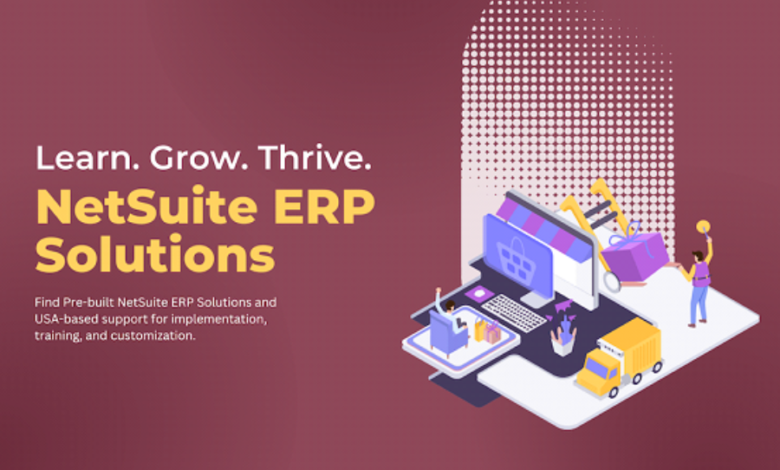NetSuite ERP: A Powerful Cloud Platform For Growing Businesses

For midsize and growing businesses seeking an enterprise resource planning (ERP) solution, NetSuite deserves strong consideration. As a cloud-based system designed for modern business, NetSuite provides a unified platform to manage key business processes – from accounting and financials to supply chain, inventory, manufacturing, CRM and more.
In this blog post, we’ll explore the capabilities of NetSuite and why it’s an attractive option for ambitiously growing companies.
Overview of NetSuite ERP
NetSuite ERP is a cloud-based business management suite that combines a wide range of capabilities into a single, unified system. Core features include:
- Financial Management – General ledger, accounts payable/receivable, multi-currency support, real-time reporting and more
- Revenue Management – Automate the entire order-to-cash process, including quotes, orders, invoicing and payments
- Supply Chain Management – Inventory control, warehouses and transfers, dropship requisition and procurement
- Manufacturing – Bills of materials, work orders, routing, quality control and planning
- CRM and Marketing – Sales force automation, marketing automation, customer support and service
- HR Management – Employee records, payroll, compensation, benefits, HR analytics and more
A key advantage NetSuite offers over many competing solutions is having all of these essential business functions in a single cloud ERP platform. This eliminates need for separate accounting, CRM, eCommerce and other software systems that must be expensively integrated.
With NetSuite, the back office integrates with customer-facing operations for greater data flow and insights. Further, NetSuite provides flexibility to add or adjust modules as business needs change.
Now let’s explore some of the key capabilities and benefits of NetSuite ERP in more detail:
Financial Management and Reporting
- NetSuite financial software provides a real-time, unified view of what’s happening across the business. Capabilities include:
- General Ledger – Track revenues, expenditures and budgets across departments, subsidiaries and currencies. Flexible customization options.
- Accounts Payable – Streamline invoice and bill payments to vendors and contractors. Enables positive pay, electronic payments and more.
- Accounts Receivable – Invoice customers, track payments due and cash flow in real-time. Easily view outstanding customer balances.
- Expense Management – Automate expense reporting, approval routing and reimbursement. Integrates with accounts payable.
- Multi-currency Support – Manage financial records and reporting in local currencies. Helps manage international operations.
- Audit and Compliance Tools – Maintain accounting controls and retention policies. Help meet regulatory obligations.
- Reporting and Dashboards – Real-time reporting through custom financial statements, reporting snapshots and built-in dashboards. Gain business insights.
Together this end-to-end financial functionality provides accurate, up-to-date visibility into financial performance. Real-time reporting allows for better, data-driven business decisions.
Commerce and Order Management
NetSuite excels at the commerce process – from quoting prospects to fulfilling orders, delivery, invoicing and payment. Key features include:
- CRM Integration – Combine quotes, orders, inventory and customer data in a single system.
- Procurement and Requisition – Automate purchasing and streamline supplier transactions.
- Order Workflow – Configure sequential steps for order fulfillment, from pending approval to processing.
- Invoicing – Flexibly generate invoices, send them to customers to collect payments online. Integrates with payment processor.
- Shipping and Inventory – Multi-location inventory, fulfillment from multiple warehouses, tracking and calculating available stock across channels.
- Drop Shipping – Directly ship products to customers from wholesalers and manufacturers. Avoid stocking inventory.
- Returns and Refunds – Handle product returns and customer refunds. Track return authorizations and replacement orders.
Taken together, NetSuite’s end-to-end order management and fulfillment functionality seamlessly connects the eCommerce experience with back-end business operations. Growing businesses can scale while providing visibility and efficiency.
Supply Chain, Inventory Management and Manufacturing
- For product-based businesses, NetSuite delivers robust tools to automate supply chain processes – from sourcing to production to fulfillment.
- Demand Planning – Forecast inventory needs based on historical data, sales projections, trends and algorithms.
- Inventory Control – Real-time visibility into inventory volumes, transfers and adjustments across multiple warehouse locations.
- Assembly Management – Issue work orders, build assembly items from BOMs (bills of materials), track work in progress and consume component parts.
- Quality Management – Define inspection criteria, test product quality, record results and track non-conformances.
- Product Data Management – Centralize specifications, requirements, components and files needed to manage products.
- Multiple Currencies – Manage supply chain transactions, inventory costs and pricing in multiple global currencies.
With these features manufacturing and distribution businesses can closely integrate production systems with financials, inventory and supply chain execution – avoiding delays, stockouts and manual inefficiencies that impact customers.
CRM and Marketing Automation
NetSuite also provides excellent CRM and marketing automation capability – essential for sales-driven companies. Features include:
- Contact and Lead Management – Track all customer interactions and sales pipeline activity in a single CRM environment.
- Marketing Automation – Configure multi-channel drip campaigns with email, social, web and ads. Leverage landing pages and forms to capture leads.
- Customer Service and Support – Manage service cases, return requests and field customer inquiries efficiently.
- Partner Relationship Management – Manage resellers, channel partners, affiliates and associated sales commissions.
- Analytics and Reporting – Embedded reporting provides insights into customer acquisition, lead conversion, campaign ROI and sales performance.
With these CRM and marketing tools, organizations gain visibility into customer interactions across channels while leveraging automation to scale outreach. Sales and service also benefit from the integrated system.
Cloud Delivery Provides Cost Efficiency
A major advantage NetSuite offers is delivery as a cloud-based Software-as-a-Service (SaaS) platform. This cloud architecture provides important cost efficiencies and advantages for growing companies including:
- Lower Upfront Costs – As cloud software, NetSuite requires no expensive upfront investment in licenses or on-premise infrastructure. Pay only for what you use.
- Scalability – Built-in flexibility and processing power to rapidly scale up (or down) as business needs change. Avoid guesswork.
- Automated Upgrades – New software updates automatically built into the cloud platform. No patches or upgrades to manually install.
- Uptime Reliability – NetSuite leverages industrial-grade cloud data centers with high availability. Avoid costly downtime events.
- Access and Collaboration – Cloud delivery enables anywhere access on any device for employees, partners and customers. Supports remote work.
By leveraging the cloud and avoiding the overhead of on-premise systems, NetSuite allows growing companies to redirect IT budget towards innovation rather than system maintenance. Scaling up globally is also easier since NetSuite operates cloud data centers around the world.
Top Reasons to Choose Anchor Group for Your NetSuite Implementation
Selecting the right partner is key to ensuring a successful NetSuite ERP implementation. Anchor Group stands apart for these reasons:
- Industry Expertise – Anchor Group focuses heavily on manufacturing, distribution and supply chain clients. Deep vertical knowledge translates to better solutions.
- Proven Methodology – Anchor Group deploys NetSuite using a structured 6 stage process refined across 200+ past software projects.
- Full Service Support – Clients gain access to Anchor Group’s team of solutions architects, developers, data migration specialists and trainers for ongoing success.
- Focus on User Adoption – Getting employee buy-in is crucial. Anchor Group’s user enablement services drive software adoption.
- Customer Success Stories – Numerous case studies showcase how Anchor Group has helped clients improve operational efficiency, visibility and revenue growth leveraging NetSuite.
In summary, Anchor Group has an outstanding track record helping manufacturing, distribution and supply chain organizations implement NetSuite ERP successfully. Their full lifecycle methodology combined with extensive NetSuite expertise positions growing companies to maximize their cloud software ROI while avoiding pitfalls.
Conclusion
NetSuite provides a powerful, unified cloud platform enabling growing businesses to automate mission-critical processes – from financials to supply chain to manufacturing to customer engagement. The agility, data visibility and scalability packed into NetSuite can be transformative. Partnering with an expert implementation firm like Anchor Group helps ensure NetSuite gets deployed strategically. Leveraging their expertise to map software capabilities to specific business objectives and processes is key to unlocking maximum value.
Hopefully this overview has provided insights into how NetSuite and Anchor Group can help ambitiously growing companies scale up with confidence. To further discuss requirements or best practices around NetSuite implementations, feel free to reach out to the ERP specialists at Anchor Group.
Don’t miss the latest updates and alerts visit: Live Buzz Insight!





